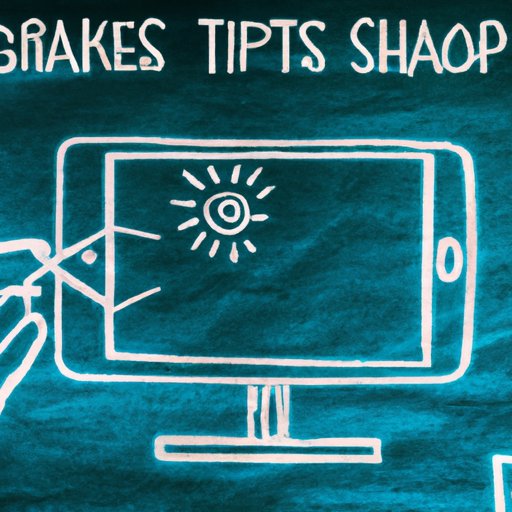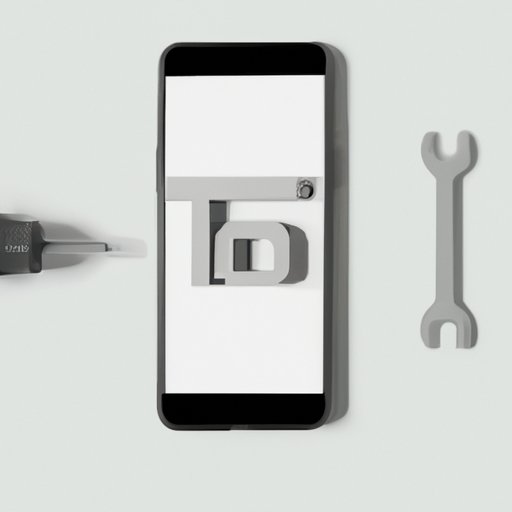Introduction
Have you ever wanted to capture an image or text on your screen for later use? A screenshot is an image of what’s currently displayed on your screen. It can be useful for a variety of reasons, like saving a webpage for future reference or capturing an error message to send to technical support. This article aims to provide a comprehensive guide to taking screenshots on any device, from Windows and Mac computers to iPhones and Androids.
A Step-by-Step Guide: How to Take a Screenshot on Any Device
Before diving into the specifics of each device, let’s go over the basic steps for taking a screenshot:
- Determine what you want to capture on your screen.
- Locate the screenshot button or shortcut on your device.
- Take the screenshot and save it to your device or clipboard.
The exact process for each device varies, so let’s explore how to take a screenshot on different devices together.
Windows
To take a screenshot on Windows, you can use the “Print Screen” button on your keyboard or the “Windows + PrtScn” shortcut.

Mac
On Mac computers, you can use the “Command + Shift + 3” shortcut to capture the entire screen or the “Command + Shift + 4” shortcut to capture a specific area of the screen.

iPhone
To take a screenshot on an iPhone, press the “Side Button” and the “Volume Up” button at the same time.

Android
The process for taking a screenshot on Android devices varies depending on the make and model. In general, you can try pressing the “Power” button and the “Volume Down” button at the same time or use the built-in screen capture function in your phone’s settings.

Taking Screenshots Made Easy: Tips and Tricks for Capturing Your Screen
Now that you know how to take a basic screenshot, let’s explore some tips and tricks for capturing your screen efficiently.
Capturing Specific Windows or Regions of the Screen
Sometimes you may only want to capture specific windows or regions of your screen. You can use keyboard shortcuts or built-in tools to achieve this.
On Windows, try using the “Alt + Print Screen” shortcut to capture the current active window.
On Mac, use the “Command + Shift + 4” shortcut and then hold down the “Spacebar” to capture a specific window.
On iPhones and Androids, you can often use a finger gesture to select a specific area of the screen to capture.
Using Tools to Make the Process Easier
There are many tools available that can make taking screenshots even easier. Snipping Tool on Windows and Grab on Mac are built-in screenshot tools that provide additional functionality, like the ability to highlight and annotate your screenshots.
Third-party tools like Snagit and Lightshot offer even more advanced features, like video recording and the ability to share your screenshots directly with others.
The Complete Guide: How to Take a Screenshot on Windows, Mac, iPhone and Android
Let’s dive deeper into the specifics of taking screenshots on each device.
Windows
To take a screenshot on Windows:
- Locate the “Print Screen” button on your keyboard.
- Press “Print Screen” to capture the entire screen or “Alt + Print Screen” to capture only the active window.
- Open a program like Paint or Word and press “Ctrl + V” to paste the screenshot.
- Save the file to your computer.
Mac
To take a screenshot on Mac:
- Press “Command + Shift + 3” to capture the entire screen or “Command + Shift + 4” to capture a specific area of the screen.
- Use the mouse to select the area of the screen you want to capture.
- Press “Command + Shift + 4” and then “Spacebar” to capture a specific window.
- The screenshot will be saved to your desktop.
iPhone
To take a screenshot on an iPhone:
- Press the “Side Button” and the “Volume Up” button at the same time.
- The screenshot will be saved to your Photos app.
Android
To take a screenshot on Android:
- Press the “Power” button and the “Volume Down” button at the same time.
- The screenshot will be saved to your Photos app or Gallery.
Mastering the Art of Screenshots: A Beginner’s Guide
Whether you’re new to taking screenshots or just want to improve your skills, these tips will help you take better screenshots that showcase exactly what you want to capture.
Composition and Settings
When taking a screenshot, think about its purpose. Are you trying to capture an entire webpage or just a specific portion? Consider adjusting the size and aspect ratio of your screenshot accordingly.
Also, look for opportunities to enhance the visual quality of your screenshot. Clear, high-resolution images will provide the best representation of what you’re trying to capture.
Editing and Using Screenshots Effectively
Once you’ve captured your screenshot, take the time to edit and use it effectively. Crop and resize the image as needed, and consider adding annotations or highlighting important areas to provide context. Use your screenshots in presentations, reports, or other projects where visuals can greatly enhance the impact of your message.
How to Take Screenshots Like a Pro: Useful Keyboard Shortcuts and Tools
Now that you’re familiar with the basics of taking screenshots, here are some keyboard shortcuts and tools that can enhance your experience even further.
Keyboard Shortcuts
Start by familiarizing yourself with the built-in keyboard shortcuts for taking screenshots on your device. On Windows and Mac, you can customize these shortcuts to your liking.
Tools
Third-party tools like Snagit and Lightshot offer even more advanced features, like video recording and the ability to share your screenshots directly with others. These tools can be especially useful for professionals who need to capture and share screenshots regularly.

A Quick Tutorial: Taking Screenshots on Your Device for Beginners
If you’re feeling overwhelmed by all the information in this article, don’t worry! Here’s a quick step-by-step guide for taking a screenshot on each device:
Windows
Press “Print Screen” on your keyboard to capture the entire screen, or “Alt + Print Screen” to capture only the active window.
Mac
Press “Command + Shift + 3” to capture the entire screen or “Command + Shift + 4” to capture a specific area of the screen.
iPhone
Press the “Side Button” and the “Volume Up” button at the same time.
Android
Press the “Power” button and the “Volume Down” button at the same time.
Conclusion
By now, you should have a comprehensive understanding of how to take a screenshot on any device, from basic keyboard shortcuts to advanced third-party tools. Remember to consider the composition and purpose of your screenshot, and take the time to edit and use it effectively.
